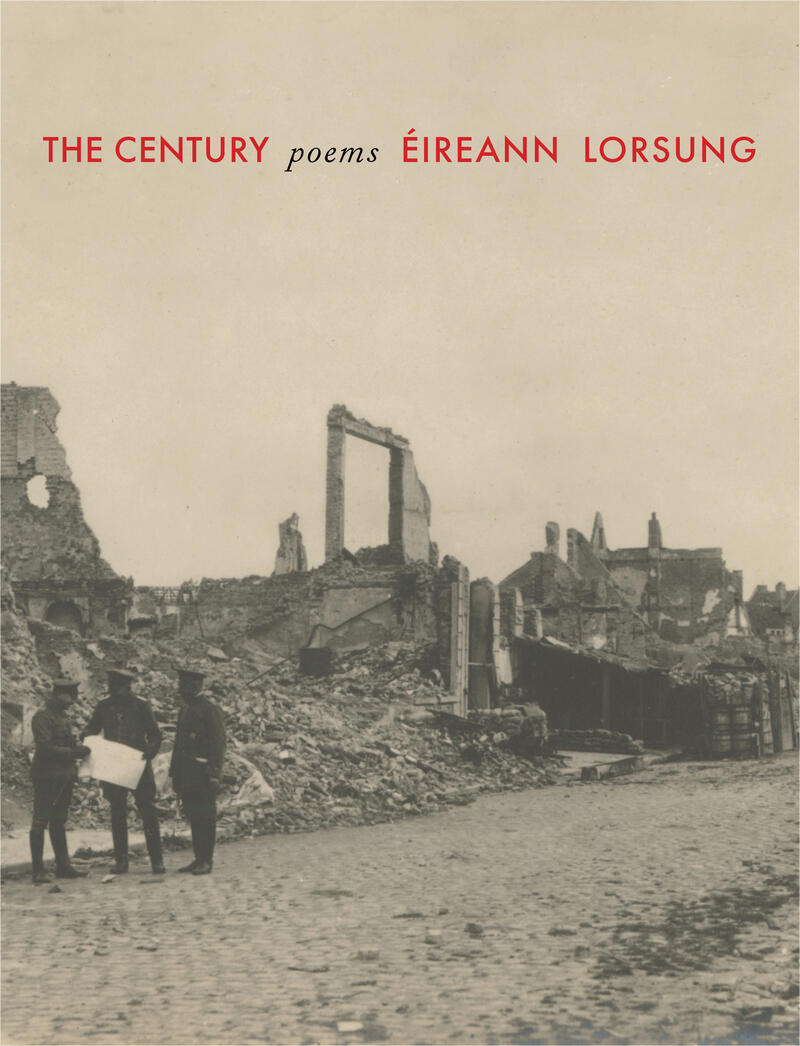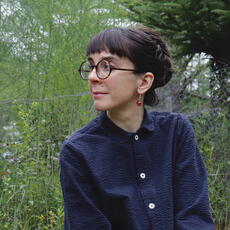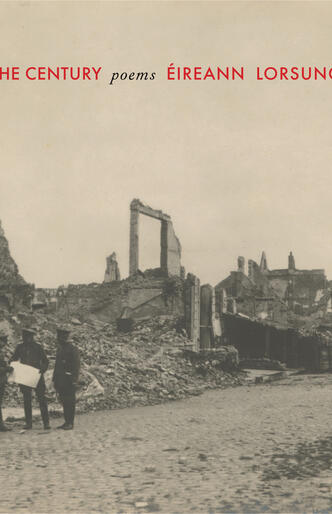5 Reasons to Teach This Book: The Century
Welcome, friends, to the latest installment of 5 Reasons to Teach This Book! In this interview series, we examine what we can learn from Milkweed’s titles by discussing our books with educators, authors, and booksellers. This month, we’re featuring Éireann Lorsung’s recently-released collection, The Century.
These poems navigate cross-continental histories as best they can with the flawed vehicle we have collectively inherited: language. “I need a language more open / than the language of forms, more / spacious than the language poetry / can be,” Lorsung writes, cueing readers to this book’s mission: not to solve the dilemma of situating oneself in those histories, but to acknowledge the danger of thinking that’s a solvable problem at all. Still, we cannot (and perhaps should not) quell the desire to try. To sift. To gather field data and chart our findings in a spreadsheet: flesh, isotopes, birch, “a diesel-powered ship setting out from Hamburg in 1939”. Lorsung’s book is evidence enough of that. Read on, friends, to learn more.

Bailey Hutchinson: Poetry is a powerful thing—not only for its ability to effect change but also for its potential to wrap us in complacency, in beauty, in inaction. The Century seems to speak from somewhere in between these poles, meeting the good art will save us all in the end attitude with a resounding that’s not enough. As a poet myself—a poet who has frequently sat in many poet-filled rooms puzzling over the paradox of cherishing our craft and knowing its danger—I’d love to know how you found yourself in that in-between space. How did you get there, and how might we follow?
Éireann Lorsung: Well, in about 2004 I was waiting in the hall for a class to begin; I was in the second year of my MFA program. And another poet, Michael Medrano was there with me. I can’t recall why we were talking about this but we were talking about poetry and politics, which at that point I had a very unnuanced understanding of. I think my position was essentially that to make a poem was enough, one didn’t have to foreground one’s politics because poems themselves were political. And Michael, quite kindly but without pulling punches, said to me, there is no poetry without politics. Poems that don’t let you know their politics have a politics of the status quo.
I think now that Michael wasn’t only talking about the way that (dominant: especially male, white) poetics don’t get identified as political while the poetics of marginalized people are politicized. I think he was also talking about the assumption that there is a neutral poetry out there to be written, and how that assumption is a gendered, raced, classed assumption. Some years later I read someone saying that to make a poem is political only in places where making a poem is punishable by imprisonment, death, etc. and that further clarified for me that my initial position was a way of cutting off the poem from the world—and that what Michael was offering was an understanding of the poem as always connected to the world, very deeply, and an understanding of what it meant to want to pretend that the poem alone was enough or that it was somehow not touched by everything else.
In that moment—which I haven’t yet finished learning from—I began my education in undoing the learned helplessness of the aesthetic separated from a sense of its own politic. I don’t think poetry will save the world, but that isn’t its responsibility, and it’s a distraction when it’s ever phrased along those lines—it among all other things we do as humans has the power, moment by moment, to acknowledge who is being hurt and who is benefiting from any given situation or interaction or image. It can also prop up domination, or embody it.
It’s only among and together with all the other ways of knowing and being that poetry makes sense, rather than in and of itself. That’s where Michael Medrano’s correction of my thinking has led me—to understanding that poetry is, like everything we do and make and are, caught in a web of relation and of power. Being able to ignore the web says something about where one is in it at a given moment.
BH: The Century is haunted by whiteness. Where it is not candidly addressed (as in “The book of splendor”), it looms just behind the book’s many named violences and tragedies (as in “Americium,” “The end of history,” and others). Can you speak to this presence?
ÉL: Yes: the logic that creates whiteness creates it in opposition to Blackness and in order to subjugate, dehumanize, and dominate it. This is a historical logic, which you can read about in books like The History of White People by Nell Irwin Painter and How the Irish Became White by Noel Ignatiev.
By historical I mean that it is not something that exists naturally but is something that is created and narrated in order to make the continuation or emergence of social systems, like enslavement, deracination, and genocide, possible or necessary.
When I began to write this book I couldn’t see, though I sensed, what unified poems about nuclear bombs, lynching, the Holocaust, EU refugee policy. As I read, wrote, listened, revised, I began to see that white supremacy, which is the root of whiteness—remember that whiteness is invented as a category in order to dominate and subjugate Black and Indigenous people whose own racialized identities emerge in contrast to whiteness—is the necessary ground for all these atrocities. You cannot use a city as a testing ground for a nuclear weapon unless you have first made all the people who live there less than human. And racialization, the othering of racialized bodies that white bodies require in order to produce themselves as white, is a way to render those people less than human.
BH: The scope of your collection is immense—physically and chronologically—yet as a reader I don’t feel dizzied by it (or rather, I feel dizzied in all the right ways). I reckon this has something to do with your research process and how you’ve sewn that research alongside metaphor and music. What was this process like for you?
ÉL: That’s interesting. Since the poems were written and revised over a very long duration, and I was reading very intensively across many fields—philosophy; art history; history, including primary sources from the 19th century to now; medical history; nuclear science (for laypeople); sociology—I think that thinking with those other texts became second nature. As they taught me, I realized their ideas had to enter the work. I also took to heart W.G. Sebald’s statement, reported by Luke Williams, that precision is a fundamental value and that “you must be particularly careful if your subject concerns horrific events. You must stick absolutely to the facts. The most plausible, perhaps even the only, approach is the documentary one. I would say that writing about an appalling state of affairs is incommensurable with traditional aesthetics.” I take ‘traditional aesthetics’ here to mean the primacy of music and figure over the facts, in which horror or sublimity are used in order to support the aesthetic project of the writer. This meant for me an attempt to be plain in my language and to try to be straightforward and direct.
BH: One of the many things I love about The Century is its commitment to culpability. It is one thing to ignore a dilemma in art; it is another thing to name it; and it is a third and much more meaningful thing, I think, to take responsibility for it. What strategies would you recommend for writers and readers who want to practice more culpability?
ÉL: That is an interesting word. I don’t feel culpable, which my dictionary has as “deserving blame”. I do feel responsible, both for how I carry myself and for the unearned access that my racedness, cisgenderedness, education, class, nationality, fluency etc. grant me in various situations. Responsibility, for me, is a way of acknowledging not my specialness or exceptionalism but my ordinary placement within a community of equals, and an invitation to joining in the shared work of building an equitable world which others have begun—as well as to the joyful work of self- and collective liberation from destructive and oppressive ways of living together.
I don’t have strategies for taking responsibility but I can offer that James Baldwin has been a central teacher for my thinking here. In “My Dungeon Shook: A Letter to My Nephew on the 100th Anniversary of Emancipation”, he writes, “it is not permissible that the authors of devastation should also be innocent. It is the innocence which constitutes the crime.” Later in the same essay, he figures white people as “in effect still trapped in a history which they do not understand and until they understand it, they cannot be released from it. They have had to believe for many years, and for innumerable reasons, that black men are inferior to white men”. He goes on to say that many white people “indeed know better, but as you will discover, people find it very difficult to act on what they know. To act is to be committed and to be committed is to be in danger. In this case the danger in the minds and hearts of most white Americans is the loss of their identity”.
Reading Baldwin has helped me understand this work of taking responsibility not as a mea culpa action or as a confession for which I can receive absolution (and then be done), but as a life’s work of my own liberation alongside everyone else. Baldwin and others—Keguro Macharia is one—have helped me experience and conceptualize this as joyful rather than fearful. Macharia and Baldwin, among others, have helped me see the dismantling of dominant structures of which I am a beneficiary—white dominance, patriarchy, capitalism—not as a paternalistic gift to those most adversely affected by such systems but as a liberatory action undertaken over and over, renewed over and over. I also want to emphasize that learning to understand myself through this work not as exceptional or special but as ordinary and part of a collective humanity has been a central recalibration (ongoing) for me. I guess I am saying cheerful willingness to work and humility are my strategies. Which I do not always succeed at.
BH: What books would you include on a syllabus featuring The Century? And (if I may greedily ask a little more of you) what writing exercises would you share with a class reading your book?
ÉL: Svetlana Alexeivich, Voices from Chernobyl
Tadeuz Borowski, This Way for the Gas, Ladies and Gentlemen
Don Mee Choi, Hardly War
June Jordan, Some of Us Did Not Die
Junko Kayashige, “My Experience of the Atomic Bombing”
Primo Levi, If This is a Man
Adrienne Rich, What Is Found There: Notebooks on Poetry and Politics
Christina Sharpe, In The Wake: On Blackness and Being
Chaun Webster, geN!tryfication
Ida B. Wells-Barnett, On Lynchings
C.D. Wright, One With Others
Writing exercise: spend the duration of one year gathering fragments of observation: allow yourself to accumulate images, observations, thoughts, criticisms, historical and contemporary events, actions, sensory data. Compile these in a document without thinking too much about them. At the end of the year, use the word processor’s “sort: alphabetical” feature to create an alphabetized ordering of these fragments. Begin, slowly, to sense a formal meaning in clusters of fragments. Work back into the list to introduce vertical white space (hard returns/line breaks). As you reread and work with vertical form, allow yourself to notice the categories of thinking, questioning, assuming, and ordering the world that are in play in the work. Use this document as a database for other poems, or consider it a poem.

